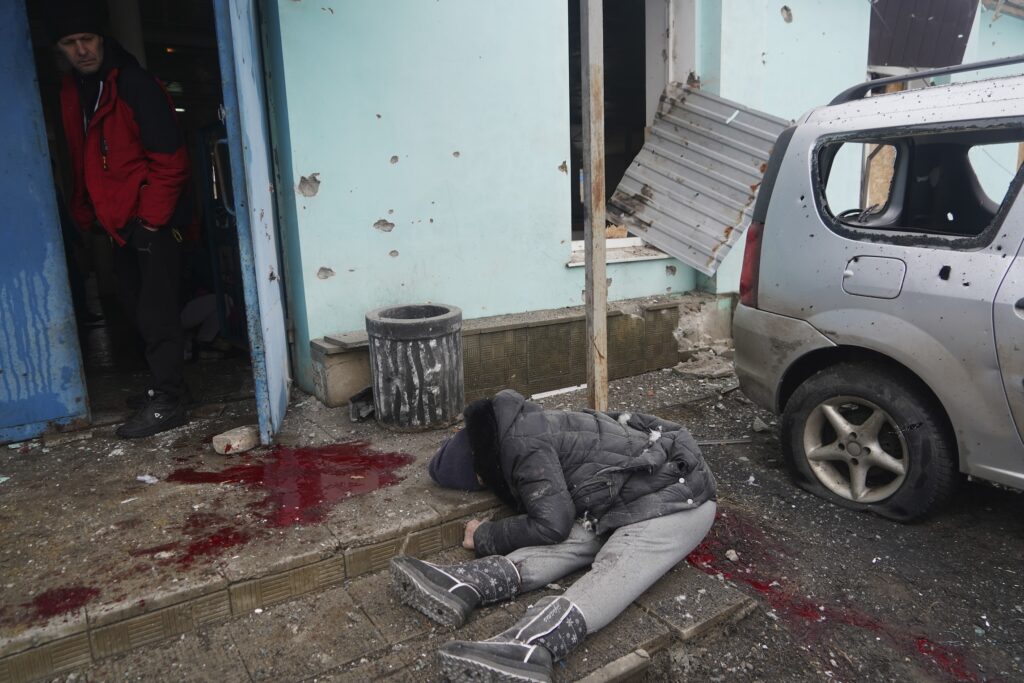NATO allies have agreed to launch a joint training center with Ukraine, seeking to broaden cooperation despite political fissures in the United States.
“It will allow Ukraine to share lessons learned from Russia’s war,” NATO Secretary General Jens Stoltenberg said Thursday. “And it will create a structure for Ukrainian forces to learn and train alongside their allied counterparts. We will continue to stand with Ukraine, for Ukraine’s security, and for ours.”
The credibility of that statement has come into question in recent months, as President Joe Biden and U.S. lawmakers have failed to agree on legislation that would authorize the funding to provide additional weapons to Ukrainian forces. That standoff has been overlaid in recent days by former President Donald Trump’s recent suggestion that he might encourage Russia to attack an ally “delinquent” in defense spending, a pairing that has forced Stoltenberg to allay trans-Atlantic misgivings about the U.S. on multiple levels.
“We know that any suggestion that we are not there to protect and defend all allies will undermine the security of all of us and put at risk our soldiers, our personnel who are on the front lines to protect the whole alliance,” Stoltenberg said earlier Thursday when asked if there will be a “two-tiered NATO alliance” if Trump wins the presidency this year. “So one for all, all for one applies for all Allies and is the heart of NATO.”
Stoltenberg also leaned on the experience of his recent trip to Washington, where he argued that “Ukraine is a good deal for the United States” because the funding is slated to be spent with U.S. defense companies, and he met with congressional leaders to discuss the prospects for new aid. In the meantime, the European allies and Canada have “compensated” to some extent for the interruption of U.S. aid, but they do not possess the military arsenal that U.S. officials can draw upon to arm Ukraine.
“The fact that the U.S. has not been able to make a decision so far has already had consequences,” Stoltenberg said. “It is impacting the flow of support.”

A bipartisan coalition of Senate lawmakers aligned to pass a supplemental spending bill on Monday, as Senate Minority Leader Mitch McConnell (R-KY) argued the funding would be “spent in this country retooling our industrial base” to ramp up production of ammunition and other armaments.
“The budgets we’ve been passing for the Defense Department are not adequate,” McConnell told National Review. “This gives us the opportunity to do something we were basically not doing through the regular order.”
U.S. support for Ukraine has developed into a lightning rod on the American Right, particularly as conservative leaders in media and Congress juxtapose that aid with scenes from the border crisis. Speaker Mike Johnson (R-LA) has pledged not to allow the Senate bill to receive a vote in the House on the grounds that it does not contain any border security or immigration-related provisions. Both Trump and House Republicans opposed the border deal that Senate Republicans tried to negotiate with Democrats in recent months.
“The mandate of national security supplemental legislation was to secure America’s own border before sending additional foreign aid around the world,” Johnson said Monday. “Now, in the absence of having received any single border policy change from the Senate, the House will have to continue to work its own will on these important matters.”
Sen. Marco Rubio (R-FL), a senior member of the foreign relations and intelligence committees, voted against the supplemental bill to protest the border crisis.
“I never asked for a bill,” Rubio told The Sean Hannity Show. “It bothers me when I read, ‘Republicans asked for a deal, and they rejected it.’ I didn’t ask for a bill. I said, ‘I want Biden to reverse all of the executive orders that he made, which created this crisis.’ That’s what I wanted to see.”
McConnell suggested the legislation would have been backed by some of the 33 Republican senators who voted against it “if we had a secret ballot” for that particular bill.
“So, we went through these several phases before we got to the point where it was pretty clear we weren’t going to be able to do the border on this bill, but that’s not a good argument for not doing the rest of it,” McConnell said.
Stoltenberg emphasized Thursday that lawmakers in both parties assured him that a majority of representatives and senators support the legislation, an assessment that underpinned his prediction that they would pass the bill eventually.
“If [Russian] President [Vladimir] Putin wins in Ukraine, it’s also a challenge for us,” Stoltenberg said. “It will be a message to authoritarian leaders, not only Putin but also to [Chinese] President Xi [Jinping], that when they use military force, they get what they want. What happens in Ukraine today can happen in Taiwan tomorrow. So this matters for our security. It matters for U.S. security. And therefore, I expect that the majority which is in the U.S. Congress, in one way or another, will be reflected in the U.S. decision.”
CLICK HERE TO READ MORE FROM THE WASHINGTON EXAMINER
In the meantime, he maintained that the training center would give Ukrainian forces another opportunity to show their value to NATO.
“This will benefit them and us and also create a platform, a framework, to train alongside allied NATO allied troops,” Stoltenberg said.
